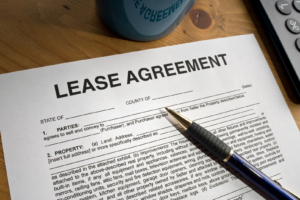Effective rental property management takes more than finding good tenants, collecting rent, and maintaining your property.
Keeping accurate records is one of the most important – yet overlooked – aspects of successful property management.
From rent payments to maintenance requests and tax records, detailed documentation plays a crucial role in protecting your interests as a property manager in Canada.
Records keep you in compliance with regulations, help you foster positive relationships with tenants, and can keep you out of trouble in the event of a dispute.
In this blog post, we’ll expand on the importance of maintaining accurate records, and show you some of the most important documents property managers should keep.
Types of Records Landlords Need to Keep

1. Legal Compliance
Accurate record-keeping is vital for ensuring compliance with local, provincial, and federal laws governing landlord-tenant relationships.
Some of the most important legal compliance documents you should keep as a landlord are:
- Your Lease Agreements: Keep copies of signed lease agreements. These documents outline the terms and conditions of the tenancy.
- Security Deposit Receipts: Record details of security deposits received from tenants, including the amount, date received, and any interest earned. Keep records of any deductions made from security deposits (e.g., for damages or unpaid rent), and security deposit refunds.
- Notices You’ve Served to Tenants: Document notices related to rent increases, lease terminations, or other important matters. This includes written notices and proof of delivery (such as certified mail receipts).
- Notices of Lease Violations: Keep formal notices of lease violations, such as for repeated late payments or improper use of the property, keep copies of these notices, along with proof of delivery. If you ever need to evict a tenant, these documents can expedite the process and prevent tenants from becoming squatters.
By maintaining comprehensive records, you can demonstrate your compliance with legal requirements and protect yourself in the event of disputes or legal proceedings.
2. Rent Payments
Recording rent payments is crucial for tracking tenants’ payment histories and identifying any discrepancies or late payments.
- Rent Payment Records: Maintain detailed records of rent payments for each tenant. Include information such as the rent amount, payment date, payment method (e.g., cash, check, electronic transfer), and any late fees.
- Payment Histories: Track tenants’ payment histories over time. This helps identify patterns and address any payment issues promptly.
This information can help you identify trends, address payment issues promptly, and effectively enforce your lease agreements.

3. Repair & Maintenance Records
To make sure you address tenant concerns promptly and keep your property in great condition, keep accurate and detailed records of repair requests and maintenance records.
You should document all maintenance requests, repairs performed, and communication with tenants regarding maintenance issues. This documentation helps you track the status of maintenance tasks, allocate resources efficiently, and demonstrate compliance with your obligation to maintain the rental property.
- Maintenance Requests: Document all maintenance requests made by tenants with the date of the request, the nature of the issue, and any actions taken to address it.
- Repairs Performed: Keep records of repairs completed at your rental properties. Include the repair date, a description of the work, and your associated costs.
- Communication with Tenants Regarding Maintenance: Record any communication with tenants related to maintenance or repairs – including discussions, agreements, and updates on repair progress.
4. Tenant Files
Keep records of your communications with tenants – including emails, phone calls, text messages, and written correspondence. With a paper trail for all of your messaging, you’ll have no problem remembering what’s going on your rental, and have a reliable source of information if there’s ever a dispute.
As a landlord, you should keep records of important discussions, agreements, and notices served to each one of your tenants tenants:
 Tenant Screening Reports: Keep records of tenant screening reports, including credit checks, background checks, and references obtained during the application process.
Tenant Screening Reports: Keep records of tenant screening reports, including credit checks, background checks, and references obtained during the application process.- Lease Renewals and Rent Increases: Document lease renewals, rent adjustments, and any changes to the tenancy terms.
- Emails, Phone Calls, and Written Correspondence: Maintain a log of all communications with current and past tenants. This includes emails, phone calls, and written letters.
- Notices of Entry: If you need to enter the rental unit (e.g., for inspections or repairs), keep records of the written notices you provide to your tenants. The law in BC states that you have to serve notices at least 24 hours and not more than 30 days prior to your entry.
Clear communication and documentation can help prevent misunderstandings, resolve disputes amicably, and protect your interests in the event of a dispute.
5. Financial Management
To help you track your cash flow, monitor profitability, and prepare your financial statements for tax purposes, maintain detailed financial records of your income and expenses. Track your rental income, property maintenance costs, utilities, taxes paid (including deductable GST), and insurance premiums.
Income and Expenses Tracking
- Rental Income: Maintain detailed records of rent payments received from tenants. Note the payment dates, amounts, and any late fees.
- Operating Expenses: Track costs related to property maintenance, repairs, utilities, property taxes, insurance premiums, and property management fees.
- Invoices and Receipts: Always keep invoices and receipts for financial transactions related to your rental property.
Mortgage and Loan Management
- Mortgage Payments: Document both the principal and interest portions of your mortgage payments.
- Loan Agreements: Keep copies of loan agreements and track any outstanding loans related to the property.
Financial Statements
- Profit and Loss Statement (Income Statement): Regularly review your income and expenses to assess your financial performance and prepare for reporting.
- Balance Sheet: Track your assets (property value, cash reserves) and liabilities (mortgage, outstanding debts).
Tax Records
- Income Tax Reporting: Keep records for your income tax filings – including rental income, deductible expenses, and capital cost allowance (CCA) calculations.
- Receipts and Invoices: Retain receipts for all deductible expenses (e.g., repairs, property management fees) so you can submit complete documentation to tax authorities.
- Property Depreciation: Understand the CCA rules for depreciation of rental properties, furniture, and appliances.
Personal Information Protection and Electronic Documents Act (PIPEDA):
Canadian landlords are obligated to comply with the Personal Information Protection and Electronic Documents Act (PIPEDA), which is Canada’s federal private sector privacy law. Alternatively, they must adhere to provincial legislation that is substantially similar to PIPEDA.
Under PIPEDA, personal information includes factual or subjective details about an identifiable individual.
Here are some essential obligations for landlords under this law:
- Obtain individual consent when collecting, using, or disclosing tenants’ personal information (except in specific defined circumstances).
- Clearly state the reasons for collecting personal information at the time of collection.
- Limit the use of personal information to the original purposes for which it was collected.
- Ensure that appropriate safeguards protect tenants’ personal data.
Landlords in BC must adhere to the Personal Information Protection Act (PIPA), which is similar to PIPEDA.
How to Store Property Management Records
Here are some best practices for record storage in Canada:
Digital Storage
- Use encrypted storage solutions for digital records. Consider cloud-based services with strong security features.
- Regularly back up your data to prevent loss due to hardware failure or other issues.
- Limit access to authorized personnel by using password protection and access controls.
Physical Records
- If you keep physical records, store them in a locked cabinet or secure area.
- Limit access to authorized individuals only.
- Consider scanning physical documents and storing them digitally to reduce reliance on paper records.
Retention Periods
- Understand the legal requirements for record retention. Different types of records may have varying retention periods.
- Generally, keep records for at least two years after the end of a tenancy.
- Dispose of records securely when they are no longer needed (e.g., shredding paper documents).
Tenant Consent
- Obtain written consent from tenants before collecting and storing their personal information.
- Clearly explain the purpose of collecting the information and how it will be used.
Sensitive Information
- Be cautious with sensitive data such as social insurance numbers, financial details, and health information.
- Store sensitive information separately and with additional security measures.
Regular Audits
- Conduct periodic audits of your records to ensure accuracy and compliance.
- Update records promptly when there are changes (e.g., lease renewals, repairs).
How to Simplify Record Keeping with Property Management Software

As property managers, staying organized is crucial. Here’s how property management software can make record-keeping easier for you:
- Centralized Data Management: Keep all your important information in one place for quick access whenever you need it.
- Efficiency Boost: Replace manual tasks with automated processes, allowing you to allocate time more effectively.
- Clear Communication: Easily track interactions with tenants and contractors to ensure everyone is on the same page.
- Financial Tracking Made Easy: Monitor rent payments, track expenses, and generate financial reports hassle-free.
- Anywhere Access: Access your records from any device with an internet connection, giving you flexibility and peace of mind.
- Compliance Confidence: Ensure compliance with legal requirements effortlessly with built-in features and templates for legal documents.
- Scalable Solution: Whether you manage a few units or a large portfolio, property management software can grow with your business.
Investing in property management software is a smart move that can simplify your operations, improve communication, help you avoid compliance issues and set you up for long-term success in the rental market.
Property Records: A Key to Success for Property Managers
Maintaining accurate property management records is essential for successful rental property management.
Records play a vital role in strengthening your legal position and safeguarding your investments. Whether you’re navigating eviction proceedings, handling security deposit disputes, or addressing property damage claims, it’s crucial to maintain essential documents.
From documenting rent payments and maintenance requests to tracking tenant communications, comprehensive record-keeping ensures compliance with legal requirements and empowers landlords to act confidently in any dispute or court proceeding.
Generally, you should keep records for at least two years after the end of a tenancy, and keep any records relating to taxation for 7 years.
When your documents are no longer needed, dispose of them securely (e.g., with a paper shredder).
By investing time and effort into record-keeping practices, you can enhance transparency, accountability, and efficiency in your property management operations, ultimately contributing to your long term success in managing rental properties.
Vantage West Property Management
At Vantage West Property Management, we understand the importance of meticulous record-keeping in the property management business.

Vantage West Property Management
Our team of experienced real estate professionals, real estate investors, and rental property owners is dedicated to providing comprehensive property management services, including thorough record-keeping and documentation practices.
Whether you’re a seasoned investor or a first-time landlord, we’re here to help you streamline your property management operations and maximize the return on your investment.
Don’t let the challenges of record-keeping overwhelm you. Contact our Kelowna property management company to learn more about our services and how we can assist you in managing your rental properties effectively. Take the first step towards peace of mind and success in your property management journey with Vantage West.
Disclaimer: The information provided in this blog post is for general guidance and informational purposes only. It does not constitute legal advice or a comprehensive set of instructions. Laws and regulations can vary by location, and specific situations may require professional legal advice. Always consult with a qualified legal professional or seek advice from relevant authorities to address your specific circumstances.

 Tenant Screening Reports: Keep records of tenant screening reports, including credit checks, background checks, and references obtained during the application process.
Tenant Screening Reports: Keep records of tenant screening reports, including credit checks, background checks, and references obtained during the application process.